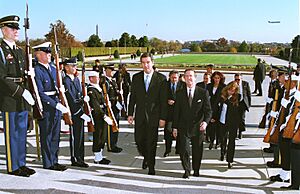Milo Đukanović facts for kids
Quick facts for kids
Milo Đukanović
|
|
|---|---|
|
Мило Ђукановић
|
|
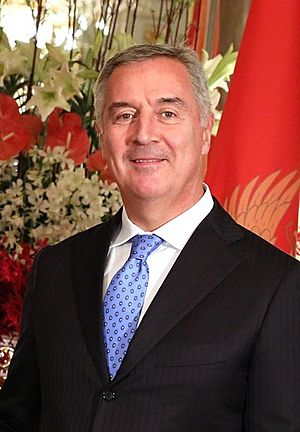
Đukanović in 2019
|
|
| 2nd President of Montenegro | |
| In office 20 May 2018 – 20 May 2023 |
|
| Prime Minister | Duško Marković Zdravko Krivokapić Dritan Abazović |
| Preceded by | Filip Vujanović |
| Succeeded by | Jakov Milatović |
| 2nd President of the Republic of Montenegro |
|
| In office 15 January 1998 – 25 November 2002 |
|
| Prime Minister | Filip Vujanović |
| President of Serbia and Montenegro | Slobodan Milošević Vojislav Koštunica |
| Preceded by | Momir Bulatović |
| Succeeded by | Filip Vujanović |
| Prime Minister of Montenegro | |
| In office 4 December 2012 – 28 November 2016 |
|
| President | Filip Vujanović |
| Preceded by | Igor Lukšić |
| Succeeded by | Duško Marković |
| In office 29 February 2008 – 29 December 2010 |
|
| President | Filip Vujanović |
| Preceded by | Željko Šturanović |
| Succeeded by | Igor Lukšić |
| In office 8 January 2003 – 10 November 2006 |
|
| President | Filip Vujanović Dragan Kujović Filip Vujanović |
| Preceded by | Dragan Đurović (Acting) |
| Succeeded by | Željko Šturanović |
| In office 15 February 1991 – 5 February 1998 |
|
| President | Momir Bulatović |
| Preceded by | Position established |
| Succeeded by | Filip Vujanović |
| Minister of Defence | |
| In office 5 June 2006 – 10 November 2006 |
|
| Prime Minister | Himself |
| Preceded by | Position established |
| Succeeded by | Boro Vučinić |
| President of the DPS | |
| In office 31 October 1998 – 6 April 2023 |
|
| Preceded by | Milica Pejanović-Đurišić |
| Succeeded by | Danijel Živković |
| Personal details | |
| Born | 15 February 1962 Nikšić, PR Montenegro, FPR Yugoslavia |
| Political party | Independent (since 2023) |
| Other political affiliations |
DPS (1991–2023) ECG (1998–2016) SKJ (1979–1991) |
| Height | 198 cm (6 ft 6 in) |
| Spouse | Lidija Kuč |
| Children | 1 |
| Relatives | Aco Đukanović (brother) |
| Alma mater | Veljko Vlahović University |
Milo Đukanović (Montenegrin Cyrillic: Мило Ђукановић; born 15 February 1962) is a Montenegrin politician. He served as the President of Montenegro from 2018 to 2023, and before that, from 1998 to 2002. He was also the Prime Minister of Montenegro for several terms (1991–1998, 2003–2006, 2008–2010, and 2012–2016).
Đukanović was the long-time leader of the Democratic Party of Socialists of Montenegro (DPS). This party, or its partners, governed Montenegro for many years after multi-party politics began in the early 1990s. He has held important positions in Montenegro for over 33 years, making him one of the longest-serving politicians in Europe. In the presidential election held on 2 April 2023, he was defeated by Jakov Milatović.
When Đukanović first became involved in politics, he was a supporter of Slobodan Milošević. His government was part of events during the breakup of Yugoslavia. In 1992, voters in Montenegro decided to remain part of FR Yugoslavia. However, by 1996, Đukanović began to disagree with Milošević. He started supporting the idea of Montenegro becoming an independent country with its own unique identity. This led to a split within his political party.
Đukanović won the 1997 Montenegrin presidential election by a small number of votes. In 1999, he worked with Western countries to try and limit airstrikes in Montenegro during the NATO bombing of Yugoslavia. Later, he helped introduce the Deutsche Mark as Montenegro's new currency, replacing the Yugoslav dinar.
After Milošević's government changed in 2000, Đukanović signed an agreement that allowed Montenegro to become independent. Three years later, in 2006, a vote for independence led to Montenegro officially separating from Serbia. Đukanović has worked to bring Montenegro closer to NATO and the European Union. Montenegro joined NATO in 2017. During his time as Prime Minister and President, he oversaw the sale of many state-owned companies to private investors.
His long time in power and some of his policies have led to criticism. In 2020, for the first time in three decades, opposition parties won more votes than Đukanović's ruling party in the 2020 Montenegrin parliamentary election.
Contents
- Early Life and Education
- Political Beginnings
- First Time as Prime Minister (1991–1998)
- Changes in Leadership and Views
- Presidency During the Kosovo War
- Transition from Yugoslavia
- Stepping Down and Returning to Politics
- Fifth Term as Prime Minister (2008–2010)
- Second Retirement (2010–2012)
- Sixth Term as Prime Minister (2012–2016)
- Re-election to Presidency (2018)
- 2020 Election and Beyond
- Economic Policies
- Timeline of Roles
- Honours and Awards
- See also
Early Life and Education
Milo Đukanović was born in Nikšić on 15 February 1962. His parents were Radovan and Stana Đukanović. His family has roots in the Ozrinići tribe and settled in the Nikšić area after 1876.
His father worked as a judge before moving to Nikšić. His mother was a nurse. Milo has an older sister, Ana, and a younger brother, Aleksandar (Aco).
Đukanović went to primary and secondary school in Nikšić. He then moved to Titograd to study at Veljko Vlahović University's Faculty of Economics. He graduated in 1986 with a degree in tourism. In his youth, Đukanović was also a keen basketball player.
Political Beginnings
In 1979, while still in high school, Đukanović joined the League of Communists of Yugoslavia (SKJ). This was the only political party allowed in Yugoslavia at the time. His father was already an important member of the party's Montenegrin branch, which helped Milo get involved.
By 1986, he was a member of the presidency for the Socialist Youth Alliance's Montenegrin branch. He was also part of the presidency for its national organization. He quickly became known for his direct and strong way of speaking. By 1988, Đukanović became the youngest member ever of the League's highest decision-making body, the Central Committee of the 13th Congress.
In January 1989, Đukanović and two others helped remove the leaders of the Montenegrin Communist League. They replaced them with people who supported their political views. Đukanović and his allies encouraged public protests in the capital, Titograd, to support these changes.
First Time as Prime Minister (1991–1998)
In the 1990 Montenegrin general election, the League of Communists of Montenegro won many seats in parliament. On 15 February 1991, Đukanović was appointed Prime Minister of Montenegro. This was the first government elected in a democratic way.
Later in 1991, the Montenegrin Communist League changed its name to the Democratic Party of Socialists of Montenegro (DPS). Đukanović's position was confirmed after the 1992 parliamentary election. In these elections, the DPS won a clear majority of seats.
Đukanović's government sent troops to fight during the breakup of Yugoslavia. He was against the separation of republics like Croatia. His government was involved in the siege of Dubrovnik from late 1991 to early 1992. During this time, Đukanović had strong views on the borders of the former Yugoslav republics.
In 1992, Đukanović supported an agreement known as the Carrington plan. This plan suggested a "loose federation of independent states." However, a clause was added that allowed republics to decide to stay in Yugoslavia through a vote. This led to the 1992 Montenegrin independence referendum on 1 March 1992, where Montenegrin voters chose to remain part of Yugoslavia.
Changes in Leadership and Views
In November 1995, Đukanović visited the the Pentagon in the United States. He was invited by the U.S. and discussed Montenegro's role in international peacekeeping. This meeting was criticized by some in Yugoslavia.
Đukanović's relationship with Milošević began to worsen after disagreements on economic policies. He also publicly criticized Milošević, calling him "a man of obsolete political ideas." As their disagreements grew, Đukanović supported students protesting in Serbia in 1996–97.
This led to a major split between Đukanović and Momir Bulatović, who had been his partner. Despite this, Đukanović's party won the 1996 Montenegrin parliamentary election. The split in the party led to a direct competition between Đukanović and Bulatović in the 1997 Montenegrin presidential election, which Đukanović won. He and his supporters began to openly support Montenegrin independence and a separate Montenegrin identity.
Presidency During the Kosovo War
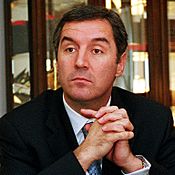
After becoming President in 1998, Đukanović shared his idea of an independent Montenegro with foreign ambassadors. On 24 March 1999, NATO began bombing Yugoslavia. During the bombings, Đukanović worked to limit airstrikes in Montenegro. After the bombings ended, he oversaw the introduction of the Deutsche Mark as the new currency in Montenegro.
In 2016, Đukanović said that 1999 was a very important year for Montenegro's choice to be independent. He mentioned rejecting a "self-destructive war with NATO" and adopting the Deutsche Mark.
Transition from Yugoslavia
In June 2000, Đukanović apologized to Croatia for Montenegro's involvement in the siege of Dubrovnik. He said he wanted to apologize to the people of Croatia for the pain and damage caused.
After the government change in Serbia in 2000, Đukanović signed the Belgrade Agreement on 14 March 2002. This agreement led to the creation of the Constitutional Charter of Serbia and Montenegro. It allowed Montenegro to hold a referendum on independence after three years. To keep his executive powers, Đukanović and Prime Minister Filip Vujanović swapped jobs. Đukanović resigned as president in November 2002 to become prime minister again in January 2003. Vujanović became president in May 2003.
The 2006 Montenegrin independence referendum resulted in Montenegro declaring independence from the state union with Serbia. After independence, Đukanović was appointed the first Minister of Defense. He also held other important roles related to economic growth and European integration.
Stepping Down and Returning to Politics
On 3 October 2006, Đukanović announced he was stepping down as prime minister, even though his party had won the election. He said he was "tired of politics" and wanted to try being a businessman. He remained the leader of his party. He served as a member of Parliament from October 2006 to February 2008.
Đukanović led the creation of the new Constitution of Montenegro on 22 October 2007. Since 2006, he has started several private businesses and invested in his brother's bank.
Fifth Term as Prime Minister (2008–2010)
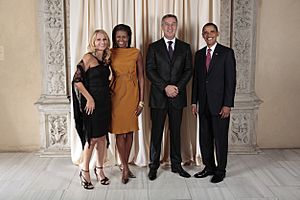

On 20 February 2008, President Vujanović nominated Đukanović to be prime minister again. He was elected on 29 February 2008. His party also won the 2009 Montenegrin parliamentary election.
During this time, Montenegro made progress towards joining the EU and NATO. On 9 October 2008, Montenegro recognized Kosovo's independence. Montenegro applied for EU membership in December 2008. In December 2009, Montenegro achieved visa-free travel with the EU. On 17 December 2010, Montenegro officially became a candidate for EU membership. Montenegro also moved closer to NATO membership.
Second Retirement (2010–2012)
After Montenegro became an official EU candidate, Đukanović resigned as prime minister on 21 December 2010. His party suggested Igor Lukšić to lead the new government. Lukšić became the new prime minister on 29 December 2010.
Đukanović kept his position as the chairman of the DPS party. He also hinted that he might run for public office again in the future.
Sixth Term as Prime Minister (2012–2016)
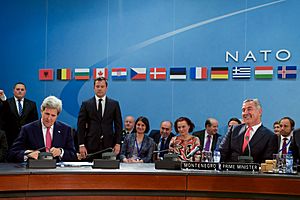
After the 2012 Montenegrin parliamentary election on 14 October 2012, Đukanović formed a new government. His cabinet was approved by Parliament on 4 December 2012, and he returned as prime minister that same day.
In 2016, after the 2016 Montenegrin parliamentary election, Đukanović stepped down as prime minister for a third time. However, he remained the leader of the DPS.
Re-election to Presidency (2018)
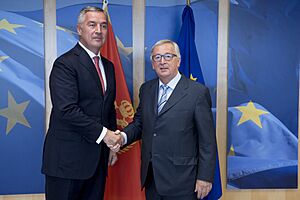
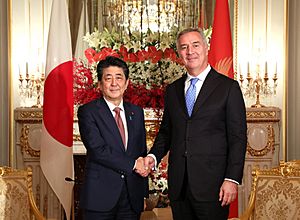
In 2018, Đukanović was announced as his party's candidate for the 2018 Montenegrin presidential election. This was his second time running for president. He won the election by a large margin.
In 2020, a report noted that Montenegro was no longer considered a full democracy. This was due to years of increasing control by the state and strong tactics used by Đukanović.
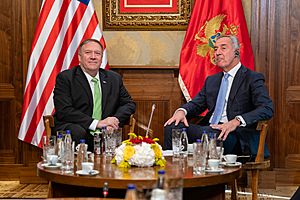
2020 Election and Beyond
For the first time in three decades, opposition parties won more votes than Đukanović's ruling DPS in the 2020 Montenegrin parliamentary election. Observers noted that the elections were competitive but held in a very divided atmosphere. They also found that the ruling party benefited unfairly from using state resources.
On 1 September 2020, Đukanović accused Serbian President Aleksandar Vučić and media in Belgrade of trying to influence Montenegro's internal politics.
Economic Policies
Đukanović's economic policies focused on developing tourism and selling state-owned companies to private businesses. For example, the Tivat shipyard was bought by a Canadian billionaire and turned into a marina for wealthy visitors. The Podgorica aluminum factory, a major industry, was sold to a Russian businessman. Many former military lands were also sold to investors.
These sales of state companies led to some criticism. Some observers noted that those close to the government became very wealthy. For instance, his brother Aleksandar, who was unemployed, gained control of a large bank in Montenegro. His sister Ana, a lawyer, owned a major law firm.
These policies also led to differences between regions and social inequality. By 2018, unemployment was much higher in the northern part of the country compared to the coastal region. Also, a quarter of the population lived below the poverty line in 2018.
Timeline of Roles
The chart below shows the different roles Đukanović held and the status of Montenegro during those times. The left side shows his terms as president and prime minister, and the right side shows Montenegro's country status.
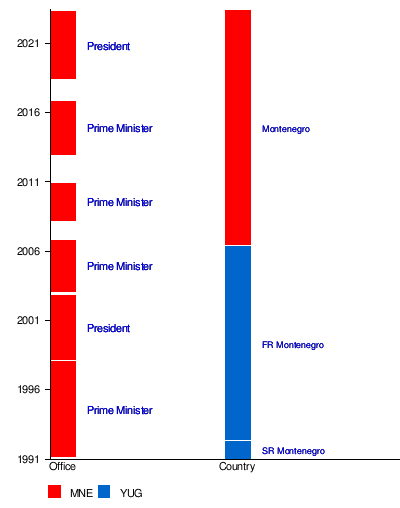
Honours and Awards
 Albanian National Flag Order received on 12 July 2016.
Albanian National Flag Order received on 12 July 2016. Collar of the National Order of Merit of Paraguay on 23 December 2018.
Collar of the National Order of Merit of Paraguay on 23 December 2018. Grand Cross of the Order of San Marino received on 4 March 2022.
Grand Cross of the Order of San Marino received on 4 March 2022.
See also
 In Spanish: Milo Đukanović para niños
In Spanish: Milo Đukanović para niños
- List of youngest state leaders since 1900
 | Isaac Myers |
 | D. Hamilton Jackson |
 | A. Philip Randolph |


